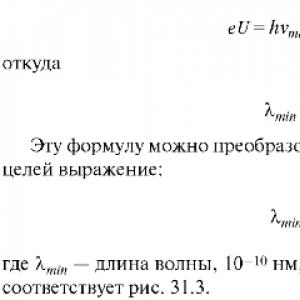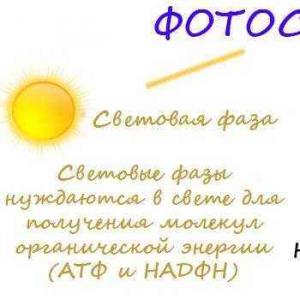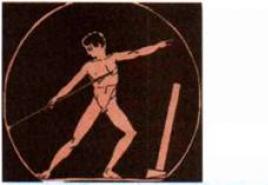Presentation on the topic of the biography of Napoleon. Presentation on the topic "Napoleon I Bonaparte"
Slide 1
Slide 2

Napoleon I Bonaparte August 15, 1769 - May 5, 1821 - Emperor of the French in 1804 -1815, French commander and statesman who laid the foundations of the modern French state.
Slide 3

Napoleon was born in Ajaccio on the island of Corsica, which for a long time was under the control of the Genoese Republic. In 1755, Corsica overthrew Genoese rule and from that time on virtually existed as an independent state under the leadership of the local landowner Pasquale Paoli, whose secretary was Napoleon's father. In 1768, the Republic of Genoa sold its rights to Corsica to the French King Louis XV. In May 1769, at the Battle of Pontenuovo, French troops defeated the Corsican rebels, and Paoli emigrated to England. Napoleon was born 3 months after these events. Paoli remained his idol until the 1790s.
Slide 4

Napoleon was the second of 13 children of Carlo Buonaparte and Letizia Ramolino, five of whom died at an early age. The family belonged to the minor aristocrats and lived on the island since the beginning of the 16th century. Although in the past Carlo Buonaparte was one of the drafters of the Constitution of Corsica, he submitted to the French sovereignty in order to be able to educate his children in France. This helped him gain the favor of the French.
Slide 5

Parents of Napoleon Bonaparte
Slide 6

In 1771, Carlo received the position of assessor and became a representative of the nobility in the Corsican parliament in Paris. Initially, the children studied at the city school of Ajaccio, later Napoleon and some of his brothers and sisters studied writing and mathematics with the abbot. Napoleon achieved particular success in mathematics and ballistics.
Slide 7

Thanks to cooperation with the French, Carlo Buonaparte managed to achieve royal scholarships for his two eldest sons, Joseph and Napoleon. In December 1778, both boys left the island and were taken to college in Autun, mainly for the purpose of learning French. The following year, Napoleon entered the cadet school in Brienne. Napoleon had no friends at college, since he came from a not very rich family, and besides, he was a Corsican, with a pronounced patriotism for his native island and hostility towards the French as the enslavers of Corsica. It was in Brienne that the name Napoleon Buonaparte began to be pronounced in the French manner - “Napoleon Bonaparte”.
Slide 8

Napoleon achieved particular success in mathematics. He was most interested in such characters as Alexander the Great and Julius Caesar. Already from that early time, Napoleon worked extremely hard and read books in various fields of knowledge: travel, geography, history, strategy, tactics, artillery, philosophy. Thanks to his victory in the Queen's Necklace competition, he was accepted into the Royal Cadet School (École royale militaire) in Paris.
Slide 9

He studied excellently during this period, read a lot, making extensive notes. On February 14, 1785, his father died and Napoleon assumed the role of head of the family. That same year, he completed his education early and began his professional career in Valence with the rank of lieutenant. In June 1788 he was transferred to Oxonne. To help his mother, he took in his 11-year-old brother Louis to raise him. He lived in those days, as before, extremely poorly, eating milk and bread twice a day. However, Napoleon tried not to show his depressing financial situation.
Slide 10

In his spare time, Napoleon loved to read and also wrote. He read a lot, and diverse literature, from novels to textbooks, from the works of Plato to the works of contemporary authors at that time - Voltaire, Pierre Corneille, Lavater, as well as scientific articles. Along with this, Napoleon read articles about military affairs. Bonaparte showed extraordinary efficiency and hard work. Napoleon's journalistic works during the revolutionary period indicate that his political sympathies were on the side of the Jacobins.
Slide 11

Released in 1785 from the Paris Military School into the army with the rank of lieutenant, Bonaparte in 10 years went through the entire hierarchy of ranks in the army of what was then France. In 1788, as a lieutenant, he tried to enter the Russian service, but was refused by Lieutenant General Zaborovsky, who was in charge of recruiting volunteers to participate in the war with Turkey. Bonaparte's first combat experience was participation in an expedition to Sardinia. The landing force landed from Corsica was quickly defeated, but Lieutenant Colonel Buonaparte, who commanded a small artillery battery of four guns, distinguished himself: he made every effort to save the guns, but they still had to be riveted, since by the time they were brought to the coast, only small ones remained there court
Slide 12

In 1789, having received leave, he went home to Corsica, where he was found by the French Revolution, which he unconditionally supported. In 1793, Pasquale Paolo declared the independence of Corsica from France, Napoleon regarded this as a betrayal of the ideas of the Great French Revolution and renounced the ideas of Paolo, whom he considered his idol in childhood. He openly opposed the policy of the Corsica authorities for complete independence and, due to the threat of political persecution, left the island and returned to France.
Slide 13

By the time of his appearance near Toulon (September 1793), he held the rank of captain of regular artillery, but in addition he also confirmed the rank of lieutenant colonel of volunteers (from September 17). Already in Toulon in October 1793, Bonaparte received the post of battalion commander (corresponding to the rank of major). Finally, appointed chief of artillery in the army besieging Toulon occupied by the British, Bonaparte carried out a brilliant military operation. Toulon was taken, and at the age of 24 he himself received the rank of brigadier general - something between the ranks of colonel and major general. The new rank was awarded to him on January 14, 1794.
Slide 14

After the Thermidorian coup, Bonaparte was first arrested due to his connections with Augustin Robespierre (August 10, 1794, for two weeks). After his release due to a conflict with the command, he resigns. In August 1795 he received a position in the topographic department of the Committee of Public Safety.
Slide 15

On March 9, 1796, Bonaparte married the widow of the general, Count of Beauharnais, executed during the Jacobin terror, Josephine, the former mistress of one of the then rulers of France, P. Barras. Some consider Barras's wedding gift to the young general to be the commander of the Italian Army (the appointment took place on February 23, 1796), but Bonaparte was proposed by Carnot for this position. Already being the commander of the Italian army, he inflicted a crushing defeat on the troops of the Kingdom of Sardinia and Austria, which glorified him as one of the best commanders of the Republic. Thus, “a new military and political star rose” on the European political horizon, and a new era began in the history of the continent, the name of which for many 20 years will be “Napoleonic Wars.”
Slide 16

Marriages and children. 1st wife: (from March 9, 1796, Paris) Josephine de Beauharnais (1763-1814), Empress of the French. They had no children. Divorced since December 16, 1809. 2nd wife: (from April 1, 1810, Saint-Cloud) Marie-Louise of Habsburg-Lorraine (1791-1847), Archduchess of Austria, Empress of the French. Had one son: Napoleon II Bonaparte (1811-1832)
Slide 17

The crisis of power in Paris reached its climax by 1799, when Bonaparte was with his army in Egypt. The corrupt Directory was unable to ensure the gains of the revolution. In Italy, Russian-Austrian troops, commanded by Alexander Suvorov, liquidated all of Napoleon's acquisitions, and there was even a threat of invasion of France. Under these conditions, a popular general who returned from Egypt, relying on an army loyal to him, dispersed the representative bodies and the Directory and proclaimed a consular regime (November 9, 1799).
Slide 18

According to the new constitution, legislative power was divided between the State Council, the Tribunate, the Legislative Corps and the Senate, which made it helpless and clumsy. The executive power, on the contrary, was gathered into one fist by the first consul, that is, Bonaparte. The second and third consuls had only advisory votes. The constitution was approved by the people in a plebiscite (about 3 million votes against one and a half thousand) (1800). Later, Napoleon passed a decree through the Senate on the lifetime of his powers (1802), and then proclaimed himself Emperor of the French (1804).
Slide 22

Napoleon was allowed to choose officers to accompany him; they were Henri-Gracien Bertrand, Charles Montolon, Emmanuel de Las Cases and Gaspard Gourgo, who were with him on the English ship. On August 7, 1815, the former emperor left Europe aboard the ship Northumberland. Nine escort ships carrying the 3,000 soldiers that would guard Napoleon on St. Helena accompanied his ship.
Slide 23

Napoleon is doomed to inactivity. His health was deteriorating, Napoleon and his retinue blamed this on the unhealthy climate of the island.
Napoleon's health condition steadily deteriorated. From 1819 he became ill more and more often. Napoleon often complained of pain in his right side and his legs were swollen. His attending physician diagnosed him with hepatitis. Napoleon suspected that it was cancer - the disease from which his father died. In March 1821, Napoleon's condition deteriorated so much that he no longer doubted his imminent death. On April 13, 1821, Napoleon dictated his will. He could no longer move without outside help, the pain became sharp and painful. Napoleon Bonaparte died on Saturday, May 5, 1821, at 17:49. He was buried near Longwood in an area called "Geranium Valley."
Slide 1
 Slide 2
Slide 2
 Slide 3
Slide 3
 Slide 4
Slide 4
 Slide 5
Slide 5
 Slide 6
Slide 6
 Slide 7
Slide 7
 Slide 8
Slide 8
 Slide 9
Slide 9
 Slide 10
Slide 10
 Slide 11
Slide 11
 Slide 12
Slide 12
 Slide 13
Slide 13
 Slide 14
Slide 14
 Slide 15
Slide 15
 Slide 16
Slide 16
 Slide 17
Slide 17
 Slide 18
Slide 18
 Slide 19
Slide 19
 Slide 20
Slide 20
 Slide 21
Slide 21
 Slide 22
Slide 22
 Slide 23
Slide 23
 Slide 24
Slide 24
 Slide 25
Slide 25
 Slide 26
Slide 26
 Slide 27
Slide 27
 Slide 28
Slide 28
 Slide 29
Slide 29
 Slide 30
Slide 30
 Slide 31
Slide 31
 Slide 32
Slide 32
The presentation on the topic "Napoleon" can be downloaded absolutely free on our website. Subject of the project: History. Colorful slides and illustrations will help you engage your classmates or audience. To view the content, use the player, or if you want to download the report, click on the corresponding text under the player. The presentation contains 32 slide(s).
Presentation slides

Slide 1

Slide 2

Slide 3
Childhood Early life Military career Rise to power Family Saint Helena Death

Slide 4

Slide 5
Napoleon was born in Ajaccio on the island of Corsica, which for a long time was under the control of the Genoese Republic. In 1755, Corsica overthrew Genoese rule and from that time on virtually existed as an independent state under the leadership of the local landowner Pasquale Paoli, whose secretary was Napoleon's father. In 1768, the Republic of Genoa sold its rights to Corsica to the French King Louis XV. In May 1769, at the Battle of Pontenuovo, French troops defeated the Corsican rebels, and Paoli emigrated to England. Napoleon was born 3 months after these events. Paoli remained his idol until the 1790s.

Slide 7
Napoleon was the second of 13 children of Carlo Buonaparte and Letizia Ramolino, five of whom died at an early age. The family belonged to the minor aristocrats and lived on the island since the beginning of the 16th century. Although in the past Carlo Buonaparte was one of the drafters of the Constitution of Corsica, he submitted to the French sovereignty in order to be able to educate his children in France. This helped him gain the favor of the French, and in 1771 Carlo received the position of assessor and became a representative of the nobility in the Corsican parliament in Paris. Initially, the children studied at the city school of Ajaccio, later Napoleon and some of his brothers and sisters studied writing and mathematics with the abbot. Napoleon achieved particular success in mathematics and ballistics.

Slide 8

Slide 9

Slide 10
Thanks to cooperation with the French, Carlo Buonaparte managed to achieve royal scholarships for his two eldest sons, Joseph and Napoleon (in total there were 5 sons and 3 daughters in the family). While Joseph was preparing to become a priest, Napoleon was destined for a military career. In December 1778, both boys left the island and were taken to college in Autun, mainly for the purpose of learning French, although Napoleon spoke with a strong accent all his life. The following year, Napoleon entered the cadet school in Brienne. Napoleon had no friends at college, since he came from a not very rich family, and besides, he was a Corsican, with a pronounced patriotism for his native island and hostility towards the French as the enslavers of Corsica. It was in Brienne that the name Napoleon Buonaparte began to be pronounced in the French manner - “Napoleon Bonaparte”. Napoleon achieved particular success in mathematics; the humanities, on the contrary, were difficult for him. For example, he was so weak in Latin that his teachers did not even allow him to take the exams. In addition, he made quite a lot of mistakes when writing, but his style became much better thanks to his love of reading. Napoleon was most interested in such characters as Alexander the Great and Julius Caesar. Already from that early time, Napoleon worked extremely hard and read books in various fields of knowledge: travel, geography, history, strategy, tactics, artillery, philosophy. Thanks to his victory (which Napoleon was very surprised by) in the Queen's Necklace competition, he was accepted into the Royal Cadet School (École royale militaire) in Paris. There he studied the following subjects: hydrostatics, differential calculus, calculus of integrals, and public law.

Slide 12
As before, he shocked teachers with his admiration for Paoli, Corsica, and hostility towards France. He fought a lot at that time, he was very lonely, Napoleon had practically no friends. He studied excellently during this period, read a lot, making extensive notes. True, he was never able to master the German language. Later, he expressed an extremely negative attitude towards this language and wondered how it was possible to learn even one of its words. On February 14, 1785, his father died, and Napoleon took on the role of head of the family, although according to the rules, the eldest son (who was not as powerful as his brilliant brother) should have become the head of the family. That same year, he completed his education early and began his professional career in Valence with the rank of lieutenant. In June 1788 he was transferred to Oxonne. To help his mother, he took in his 11-year-old brother Louis to raise him. He lived in those days, as before, extremely poorly, eating milk and bread twice a day. However, Napoleon tried not to show his depressing financial situation. In his spare time, Napoleon loved to read and also wrote. Tarle writes that at this time he studied more than created his own ideas. He read a lot, and diverse literature, from novels to textbooks, from the works of Plato to the works of contemporary authors at that time, for example Voltaire, Pierre Corneille, Lavater, as well as scientific articles. Goethe's The Sorrows of Young Werther was read by Napoleon many times. Along with this, Napoleon read articles on military affairs, and later, when he became increasingly interested in politics, Jean-Jacques Rousseau became his favorite author. A little later - Guilliam Raynal. Bonaparte showed extraordinary efficiency and hard work. Napoleon’s journalistic works during the revolution (“Dialogue of Love”, “Dialogue sur l’amour”, 1791, “Dinner at Beaucaire”, “Le Souper de Beaucaire”, 1793) indicate that his political sympathies were on the side of the Jacobins.

Slide 14

Slide 15
Released in 1785 from the Paris Military School into the army with the rank of lieutenant, Bonaparte in 10 years went through the entire hierarchy of ranks in the army of what was then France. In 1788, as a lieutenant, he tried to enter the Russian service, but was refused by Lieutenant General Zaborovsky, who was in charge of recruiting volunteers to participate in the war with Turkey. Literally a month before Napoleon’s request for admission into the Russian army, a decree was issued on the admission of foreigners to serve at a lower rank, to which Napoleon did not agree. In the heat of the moment, he ran out from Zaborovsky, shouting that he would offer his services to the King of Prussia: “The King of Prussia will give me the rank of captain.” Bonaparte's first combat experience was participation in an expedition to Sardinia. The landing force landed from Corsica was quickly defeated, but Lieutenant Colonel Buonaparte, who commanded a small artillery battery of four guns, distinguished himself: he made every effort to save the guns, but they still had to be riveted, since by the time they were brought to the coast, only small ones remained there court In 1789, having received leave, he went home to Corsica, where he was caught by the French Revolution, which he unconditionally supported. In 1793, Pasquale Paolo declared the independence of Corsica from France, Napoleon regarded this as a betrayal of the ideas of the Great French Revolution and renounced the ideas of Paolo, whom he considered his idol in childhood. He openly opposed the policy of the Corsica authorities for complete independence and, due to the threat of political persecution, left the island and returned to France. By the time of his appearance near Toulon (September 1793), he held the rank of captain of regular artillery, but in addition he also confirmed the rank of lieutenant colonel of volunteers (from September 17). Already in Toulon in October 1793, Bonaparte received the post of battalion commander (corresponding to the rank of major). Finally, appointed chief of artillery in the army besieging Toulon occupied by the British, Bonaparte carried out a brilliant military operation. Toulon was taken, and at the age of 24 he himself received the rank of brigadier general - something between the ranks of colonel and major general. The new rank of Bonaparte was awarded to him on January 14, 1794.

Slide 17
After the Thermidorian coup, Bonaparte was first arrested due to his connections with Augustin Robespierre (August 10, 1794, for two weeks). After his release due to a conflict with the command, he retired, and a year later, in August 1795, he received a position in the topographic department of the Committee of Public Safety. At a critical moment for the Thermidorians, he was appointed by Barras as his assistant and distinguished himself during the dispersal of the royalist rebellion in Paris (Vendemiere 13, 1795), was promoted to the rank of division general and appointed commander of the rear forces. Less than a year later, on March 9, 1796, Bonaparte married the widow of the general, Count of Beauharnais, executed during the Jacobin Terror, Josephine, the former mistress of one of the then rulers of France, P. Barras. Some consider Barras's wedding gift to the young general to be the commander of the Italian Army (the appointment took place on February 23, 1796), but Bonaparte was proposed by Carnot for this position. Already being the commander of the Italian army, he inflicted a crushing defeat on the troops of the Kingdom of Sardinia and Austria, which glorified him as one of the best commanders of the Republic. Thus, “a new military and political star rose” on the European political horizon, and a new era began in the history of the continent, the name of which for many 20 years will be “Napoleonic Wars.”

Slide 19

Slide 20
The crisis of power in Paris reached its climax by 1799, when Bonaparte was with his army in Egypt. The corrupt Directory was unable to ensure the gains of the revolution. In Italy, Russian-Austrian troops, commanded by Alexander Suvorov, liquidated all of Napoleon's acquisitions, and there was even a threat of invasion of France. Under these conditions, a popular general who returned from Egypt, relying on an army loyal to him, dispersed the representative bodies and the Directory and proclaimed a consular regime (November 9, 1799). According to the new constitution, legislative power was divided between the State Council, the Tribunate, the Legislative Corps and the Senate, which made it helpless and clumsy. The executive power, on the contrary, was gathered into one fist by the first consul, that is, Bonaparte. The second and third consuls had only advisory votes. The constitution was approved by the people in a plebiscite (about 3 million votes against one and a half thousand) (1800). Later, Napoleon passed a decree through the Senate on the lifetime of his powers (1802), and then proclaimed himself Emperor of the French (1804). When Napoleon came to power, France was at war with Austria and England. Bonaparte's new Italian campaign resembled the first. Having crossed the Alps, the French army unexpectedly appeared in Northern Italy, enthusiastically greeted by the local population. The decisive victory was the Battle of Marengo (1800). The threat to the French borders was eliminated.

Slide 22

Slide 23
Marriages and children 1st wife: (from March 9, 1796, Paris) Josephine de Beauharnais (1763-1814), Empress of the French. They had no children. Divorced since December 16, 1809. 2nd wife: (from April 1, 1810, Saint-Cloud) Marie-Louise of Habsburg-Lorraine (1791-1847), Archduchess of Austria, Empress of the French. Had one son: Napoleon II Bonaparte (1811-1832) Adopted children (children of Josephine de Beauharnais from her first marriage) Eugene de Beauharnais (1781-1824), Duke of Leuchtenberg Hortense de Beauharnais (1783-1837), Duchess of Saint-Leu Extramarital affairs connection Eleanor Denuelle de La Plenie (1868) Charles Leon (1806-1881) Extra. connection Maria Lonchinska, Countess Valevskaya (1786-1817) Alexander Valevsky (1810-1868) Extra. connection Albina de Vasal (by third marriage Montolon) (1779-1848) Josephine Napoleone de Montolon (1818-1819)

Slide 24

Slide 25
Napoleon was allowed to choose officers to accompany him; they were Henri-Gracien Bertrand, Charles Montolon, Emmanuel de Las Cases and Gaspard Gourgo, who were with him on the English ship. In total, there were 27 people in Napoleon's retinue. On August 7, 1815, the former emperor left Europe aboard the ship Northumberland. Nine escort ships carrying the 3,000 soldiers that would guard Napoleon at Saint Helena accompanied his ship. On October 17, 1815, Napoleon arrived in Jamestown, the island's only port. The habitat of Napoleon and his retinue was the vast Longwood House (the former summer residence of the Governor General), located on a mountain plateau 8 kilometers from Jamestown. The house and the area adjacent to it were surrounded by a six-kilometer-long stone wall. Sentinels were placed around the wall so that they could see each other. Sentinels were stationed on the tops of the surrounding hills, reporting all of Napoleon's actions with signal flags. The British did everything to make Bonaparte's escape from the island impossible. The deposed emperor initially had high hopes for a change in European (and especially British) policy. Napoleon knew that the Crown Princess of the English throne, Charlotte (daughter of the Prince Regent, the future George IV), was a passionate admirer of his. However, the princess died in childbirth in 1817, while her father and sick grandfather were still alive, without having time to “summon” Napoleon, which he had hoped for. The new governor of the island, Goodson Law, further restricts the freedom of the deposed emperor: he narrows the boundaries of his walks, requires Napoleon to show himself to the guard officer at least twice a day, and tries to reduce his contacts with the outside world. Napoleon is doomed to inactivity. His health was deteriorating, Napoleon and his retinue blamed this on the unhealthy climate of the island.

Slide 27

Slide 28
Napoleon's health condition steadily deteriorated. From 1819 he became ill more and more often. Napoleon often complained of pain in his right side and his legs were swollen. His attending physician diagnosed him with hepatitis. Napoleon suspected that it was cancer - the disease from which his father died. In March 1821, Napoleon's condition deteriorated so much that he no longer doubted his imminent death. On April 13, 1821, Napoleon dictated his will. He could no longer move without outside help, the pain became sharp and painful. Napoleon Bonaparte died on Saturday, May 5, 1821, at 17:49. He was buried near Longwood in an area called "Geranium Valley." In 1840, Louis Philippe, yielding to Bonapartist pressure, sent a delegation to Saint Helena to fulfill Napoleon's last wish - to be buried in France. Napoleon's body has been kept in the Les Invalides in Paris since 1840. The material for the manufacture of the monument installed here, sculpted from Karelian porphyry, was kindly donated to the French government by Emperor Nicholas I. There is a version that Napoleon was poisoned. However, the authors of the book “Chemistry in Forensics” L. Leistner and P. Bujtash write that “the increased content of arsenic in hair still does not give grounds to unconditionally assert the fact of deliberate poisoning, because the same data could have been obtained if Napoleon had systematically used drugs , which contain arsenic."
Napoleon Bonaparte. One Hundred Days of Napoleon.
Completed by a student of grade 8 “A”
MBOU "Tat. Kargalinskaya sosh"
Yanbulatova Alsou

Napoleon Bonaparte

- "Napoleon's Hundred Days" is a short period from his return from exile on the island of Elba to Paris until his final defeat.
One Hundred Days of Napoleon Baron Felician
MIRBACH-REINFELD

- Defeat in the Franco-Russian War of 1812 led to the collapse of Napoleon's empire and in 1814, after the entry of the anti-French coalition troops into Paris, Napoleon abdicated the throne and was exiled to the island of Elba.
- During his exile on Elba, Napoleon I closely followed the events in France and the progress of the Congress of Vienna, which summed up the victorious wars of the anti-French coalition. Knowing the dissatisfaction of the French with the rule of Louis XVIII and the disputes between the victorious powers, Napoleon tried to seize power again.

- On February 26, Napoleon, together with a group of comrades, sailed to France and five days later landed in the south of the country. King Louis XVIII sent an army against Napoleon, which, however, went over to the side of the ex-emperor.
Napoleon leaves Elba
and returns to France

- On March 13, Napoleon issued a decree restoring the Empire and on March 20 entered Paris victoriously. The king and his court moved from the capital to Ghent in advance. From March 20, 100 days of Napoleon's re-rule begin.

- The Allies, frightened by the news of Napoleon's return to power, created the seventh anti-Napoleonic coalition. On June 18 at Waterloo, Napoleon's army was defeated, and on June 22 he abdicated the throne again. After leaving France, Napoleon voluntarily arrived on the English warship Bellerophon in the port of Plymouth, hoping to receive political asylum from his longtime enemies - the British.
Ship "Bellerophon"

- However, Napoleon was arrested and spent the last six years of his life in captivity on the island of St. Helena, where he died in 1821. In 1840, Napoleon's remains were transported to France and reburied at Les Invalides in Paris.
Napoleon on the island of Saint Helena.
Sandmann Tamerlan.








